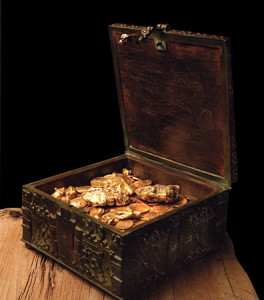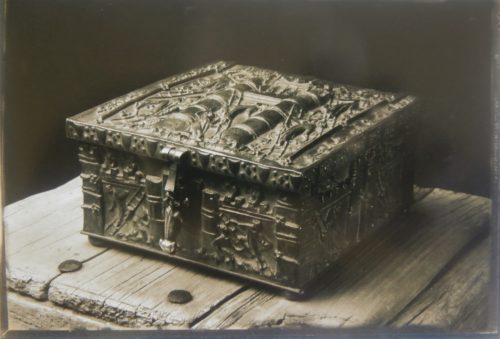 Would you want the person that finds your treasure to admire the place where it rests? Andrew
Would you want the person that finds your treasure to admire the place where it rests? Andrew
.
Well Andrew, I’m not sure “admire” is the right word but if we twist it a little maybe we can make it work. The word means approval or high regard. So it works. I sure feel that way or I would not have hidden it there. I like the way you think Andrew. f


Well that makes me think of a different possibility for ‘water high’…….’high regard’?
Thanks for another interesting answer, Forrest….
Not to mention that “eric” was pinched from America.
I think that Forrest’s response might be a hint about the proper method for extracting the clues from the poem. The first step might be to pay attention to the capital letters. The only ones that start sentences are W, T, S, and I. These are the only letters in the word “twist,” which just happens to show up in his answer. If you rearrange the letters to yield W-I-S-T, you almost have “twist,” but to complete it you have to literally twist the four letters around on themselves into a circle. Forrest also suggests that we “twist” the word “admire.” When we pinch off the “re” at the end and put it in front, we get “read mi'” which might be a hint to pay close attention to what he is writing.
A similar clue might be the pair of W-As, one in the question and one in the answer. A is the first letter of the alphabet and W is the 23rd, so W-A can be equated with 2-3-1. To put these numbers in proper order you would need to pinch off the last number and attach it to the front.
At some point I suggested that pinching letters from the ends of words and reassembling them might be an important method for generating the clues, and I suggested that the main hint in this direction was the fact that the name Eric Sloane was hidden in the first and third lines of the first stanza. This approach does not, strictly speaking, involve the use of a code or a cipher, but does treat the poem as a puzzle, as opposed to a set of directions to be taken literally.
Jenny K.
It has been awhile since I posted a comment but here goes…
Water…
High Regard…
Put them together… Regard Water… Is it… High water… Water / High regard… Danger… Respected
So could it be an area to be respected, concerning water and possible danger lurking if not observant and moving with utmost care… Could it be a location that is not always involved with High Water but when it is High Regard must be used?
Could it also mean that there is definately water Involved… or being wet, slippery, and any movement must include a definate mindset that includes a High Regard for Location and Personal Safety? As it could be a simple… “Hey theres Water!…. Have High regard!” Reasoning being that the location may be Higher then normal… Water is involved… So being Wet, Slippery and the Height Involved Regard (Logical Mindset) Must be used!
well, thanks for stopping by and commenting again, davidstipek :)……thoughts to think about….
Thank you, Jenny, for the service you provide to us Intel vultures! And, of course, thank you forrest! 🙂
I don’t see the words high regard or approval as important as “…if we twist it a little maybe we can make it work…” But as always an interesting answer to an interesting question.
Your understanding and use of the English language is outstanding. I keep my dictionary on my desk because of you.
Two more thoughts along the lines I described this morning.
First, list ALL the capital letters in Forrest’s reply:
W A I T S I I A (note that the final A requires Forrest to uncharacteristically repeat the name Andrew)
Pinch the terminal I A and place it in front. This yields:
I A W A I T S I I.
I get I AWAIT, but I had to stare at the S with the two Is for a while. And then it came to me. Just group them all together. An S with two vertical lines superimposed on it is a symbol for a dollar sign, a common variation of $.
So we have “I await $.”
Also, by ending his message with the extra “Andrew,” the message begins and ends with the same letter, the all important W, bringing us back to the idea of turning a line into a circle. I think I mentioned a while back that if you lay out all six stanzas and bend the last around to meet the first, the words on the top and bottom lines that meet up are “and good as gold.”
You missed an “I”.
Forrest Fenn has said that full page color ads are the way to go for his gallery… money well spent.. If I remember right. Apply the same logic to the 9 clues. IMHO
Liviu-
I did indeed omit one in the first set of letters, but it was back in when the letters were rearranged, so it still works out as I described. It’s nice to know that someone to the time to check my work!
Best,
Liz
Admire, approval, high regard… If I’m not mistaken all are synonymous with… RESPECT…!
OH, and I do love the “twist” he put on it…Nice catch Seeker…
Twist combined with high respect sounds like snakes or slippery. (see Eric Sloane’s sketch of his old Ford “that could twist like a snake”). I hope others investigate the territory they plan to hike through and understand whose home they are in.
.
Eliza wrote
“The only ones that start sentences are W, T, S, and I. These are the only letters in the word “twist,” which just happens to show up in his answer” and subsequent related to “I / IT / WAITS””
Nice ! And look at the last letters in each line … “skew’d”
There is a line from a previous puzzle … “IT WAITS / IT WAITS FOR YOU (U)” (the treasure).
astree
Eliza,
His other cue looks like “if we twist IT a little maybe we can make IT work”
astree
Although it was already known the resting place of the chest is in a ‘special place’ to Forrest, this answer seems to confirm that we too will recognize this uniqueness once there.
If I consider some of the past places I liked/visited and ask myself ‘would everyone think this place is ‘special’’, I know I can let some go.
For me, it seems finding the chest at location will not only reveal Forrest’s treasure, but also another we will have ‘high regard’ for.(not necessarily physical)
I’m not sure if I mentioned the following in a reply to an email or comment on another post, but I love the way everyone thinks so differently in order to understand the poem and find the treasure. It always amazes me. Thanks for sharing and respecting each other’s ideas. We probably each hold at least one correct piece to Forrest’s puzzling mind.
“special place” [ paraphrasing ] He knew right were he want the chest to be. Could not think of another place to spend a few millenniums. If the time come and he could, he would throw himself on the chest…. that would be his boldest move of all.
regard, gaze
n. a long fixed look; “he fixed his paternal gaze on me”
respect, regard, esteem
n. the condition of being honored (esteemed or respected or well regarded);
regard, esteem, respect
n. an attitude of admiration or esteem.
consider, regard
v. look at attentively, to look or gaze
Where ever the chest lays in wait, For myself, it seem Fenn surely wants to share something with the finder about this place.
I agree Seeker. It makes me want to discover this place all the more…..how wonderful it must be.
http://artdaily.com/news/25988/Devils-Tower-Opens-New-Interpretive-Site-and-World-Peace-Sculpture-
http://rapidcityjournal.com/news/local/top-stories/devils-tower-to-open-interpretive-site-unveil-world-peace-sculpture/article_c8c54e9d-5e9d-5a0c-b706-b2bd87b33f2d.html
Since we are bending and twisting things, I couldn’t help but to think of this place where non-meek are at peace.
The Wolf
This is just for fun and a bit of a stretch, by maybe astree is suggesting to mold a T and an I together to make a π, a pi. So we have TI >> PI >>> TIPI, a conical tent used by Native Americans living in the Great Plains. (and I also could not help but notice that the initial letters in the four lines of astree’s comment (#11) spell TENT).
The chapter in TTOTC, My Spanish Toy Factory, is filled with references to round objects (marbles, tops, and coins, and the last paragraph is filled with words containing the letters pi. There is even a reference to breaking two pies, and 2π corresponds to a circle. There is a circle in the picture and 3 boys on one side plus 1 boy on the other yields 4. 3.14 is a good approximation of π.
I think that a circle divided in half is important to the puzzle.
Eliza: You said, “I think that a circle divided in half is important to the puzzle”,…and so do I:
http://en.wikipedia.org/wiki/Phi
See Also: “Ef”
Pingback: End of Line Club - Page 401
Hindsight is 20/20. The question is where do we go from here?